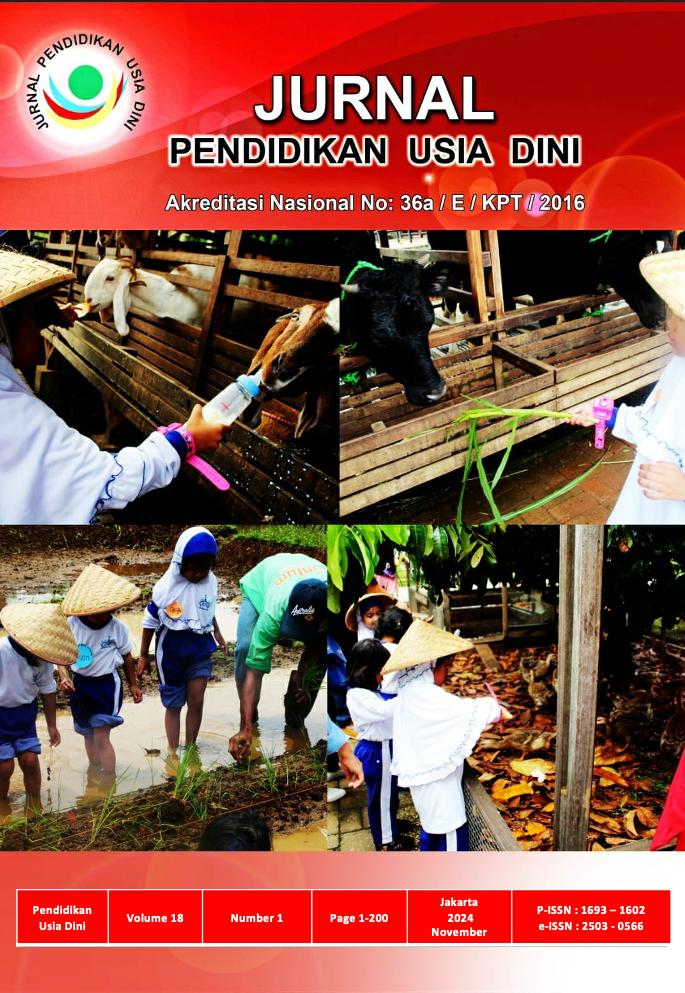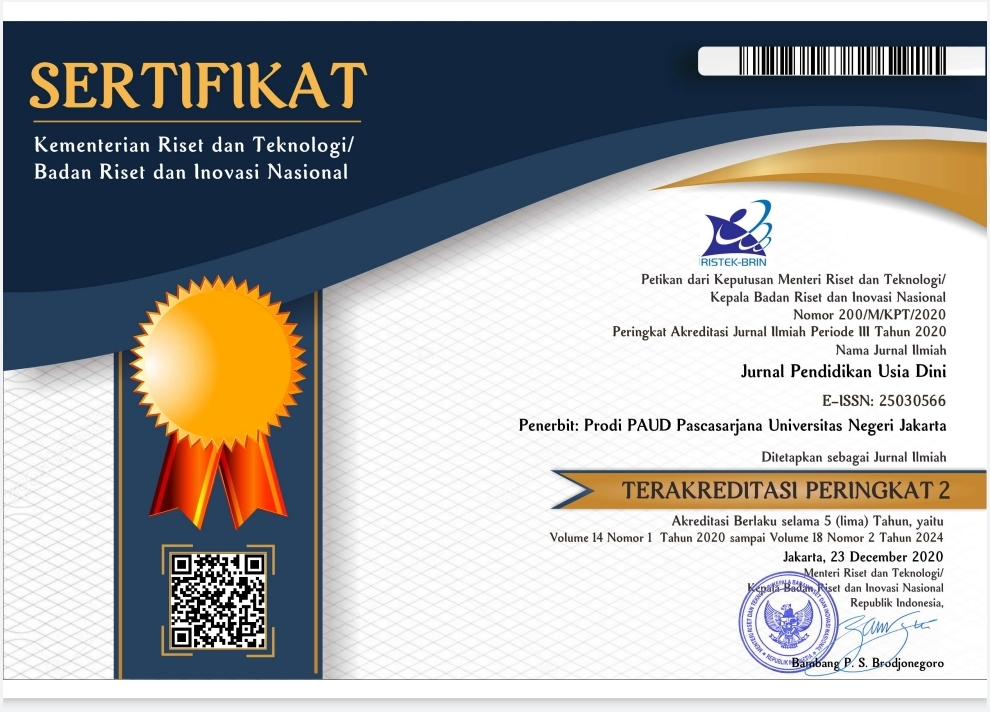The Influence of Socioeconomic Status on Executive Functions
Causal Study in Kindergarten Group B DKI Jakarta Province in 2024
DOI:
https://doi.org/10.21009/jpud.v18i2.50298Keywords:
Executive Function, Socio-Economic Status, Causal Study, Kindergarten Group BAbstract
This study aims to examine the influence of socioeconomic status on executive function in Kindergarten children (Group B) in the DKI Jakarta Province in 2024. Using a quantitative causal associative approach with a survey method and path analysis technique, this research involved 102 students selected through multistage cluster random sampling. Data were collected using a modified BRIEF-P instrument to measure executive function and a questionnaire to assess socioeconomic status. The results indicate a significant favorable influence of socioeconomic status on children's executive function (path coefficient 0.358, t-value 5.47). Children with higher socioeconomic status tend to have better executive functions. These findings highlight the importance of interventions to improve executive function, particularly for children from lower socioeconomic backgrounds, to support their future academic success. This research provides valuable insights for developing more inclusive and equitable early childhood education policies.
References
Azka, F., & Hendrawan, D. (2023). Intelligence Profile and Executive Function Between Children with Typical Development and Children with High-Functioning Autism Spectrum Disorder. Jurnal Psikologi. https://doi.org/10.22146/jpsi.73068
Bradley, A., & Smith, J. (2015). Social inequality and economic mobility: A study of modern society. Academic Press.
Diamond, A. (2020). Executive functions. In Handbook of Clinical Neurology (1st ed., Vol. 173). Elsevier B.V. https://doi.org/10.1016/B978-0-444-64150-2.00020-4
Edgar, E. V. (2023). The effects of socioeconomic status on working memory in childhood are partially mediated by intersensory processing of audiovisual events in infancy. Infant Behavior and Development, 72. https://doi.org/10.1016/j.infbeh.2023.101844
Hackman, D. A., Gallop, R., Evans, G. W., & Farah, M. J. (2015). Socioeconomic status and executive function: Developmental trajectories and mediation. Developmental Science, 18(5), 686–702. https://doi.org/10.1111/desc.12246
Harianto, L. F., & Theresia, E. (2022). ATTENTIVE PARENTING AND PARENTING STRESS IN PARENTS WITH CHILDREN AGED 2-6 YEARS. Jurnal Psikologi. https://doi.org/10.35760/psi.2022.v15i2.5382
Jakarta, D. P. P. D. K. I. (2024). Basic education data (Dapodik) - 1. DKI Jakarta Provincial Education Office. https://dapo.kemdikbud.go.id/pd/1/010000
Jusienė, R. (2020). Executive function and screen-based media use in preschool children. Infant and Child Development, 29(1). https://doi.org/10.1002/icd.2173
Kara, B. (2023). The Role of Socioeconomic Adversity and Armed Conflict in Executive Function, Theory of Mind and Empathy in Children. Child Psychiatry and Human Development, 54(2), 533-545. https://doi.org/10.1007/s10578-021-01270-y
Keller, A. S. (2023). Caregiver monitoring, but not caregiver warmth, is associated with general cognition in two large sub-samples of youth. Developmental Science, 26(3). https://doi.org/10.1111/desc.13337
Lawson, G. M., & Farah, M. J. (2017). Executive function as a mediator between SES and academic achievement throughout childhood. International Journal of Behavioral Development, 41(1), 94-104. https://doi.org/10.1177/0165025415603489
Lisca, S. M., & Pratiwi, I. (2023). The Relationship between Food Intake, Socioeconomics and the Role of Health Workers with the Nutritional Status of Toddlers. SIMFISIS Indonesian Midwifery Journal. https://doi.org/10.53801/sjki.v2i4.144
Mauer, E. (2023). Longitudinal relations between self-regulatory skills and mathematics achievement in early elementary school children from Chinese American immigrant families. Journal of Experimental Child Psychology, 227. https://doi.org/10.1016/j.jecp.2022.105601
McHarg, G. (2020). Screen Time and Executive Function in Toddlerhood: A Longitudinal Study. Frontiers in Psychology, 11. https://doi.org/10.3389/fpsyg.2020.570392
Peristeri, E. (2020). The impact of bilingualism on the narrative ability and the executive functions of children with autism spectrum disorders. Journal of Communication Disorders, 85. https://doi.org/10.1016/j.jcomdis.2020.105999
Raffington, L. (2023). Socially Stratified Epigenetic Profiles Are Associated With Cognitive Functioning in Children and Adolescents. Psychological Science, 34(2), 170–185. https://doi.org/10.1177/09567976221122760
Silveira, S. (2020). Impact of Childhood Trauma on Executive Function in Adolescence—Mediating Functional Brain Networks and Prediction of High-Risk Drinking. Biological Psychiatry: Cognitive Neuroscience and Neuroimaging, 5(5), 499–509. https://doi.org/10.1016/j.bpsc.2020.01.011
Sugiono. (2014). Education Research Methods: Quantitative, Qualitative and R&D Approaches. In Alfabeta Bandung.
Sunarya, J. (2019). The Effect of Parents' Socioeconomic Status and Learning Environment on Indonesian Language Learning Achievement. Discourse: Journal of Indonesian Language Education. https://doi.org/10.30998/diskursus.v1i02.5290
Susanti, D., Hasmira, H., & Sukarnih Putri, M. (2023). The Role of Brain Executive Function in Child Development. Indonesian Journal of Education. https://doi.org/10.59141/japendi.v4i01.1524
UNICEF. (2014). Building Better Brains: New Frontiers in Early Childhood Development. 18.
Watson, B. C., & Wilson, W. J. (1988). The Truly Disadvantaged: The Inner City, The Underclass, and Public Policy. The Journal of Negro Education. https://doi.org/10.2307/2295455
Welsch, L. (2021). The effect of physical activity interventions on executive functions in children with ADHD: A systematic review and meta-analysis. Mental Health and Physical Activity, 20. https://doi.org/10.1016/j.mhpa.2020.100379
Wong, O. W. H. (2023). Executive function as a generalized determinant of psychopathology and functional outcome in school-aged autism spectrum disorder: A case-control study. Psychological Medicine, 53(10), 4788–4798. https://doi.org/10.1017/S0033291722001787
Yang, Y. (2022). Child executive function and future externalizing and internalizing problems: A meta-analysis of prospective longitudinal studies. In Clinical Psychology Review (Vol. 97). https://doi.org/10.1016/j.cpr.2022.102194
Downloads
Published
How to Cite
Issue
Section
License
Copyright (c) 2024 https://creativecommons.org/licenses/by/4.0/

This work is licensed under a Creative Commons Attribution 4.0 International License.
JURNAL PENDIDIKAN USIA DINI work is licensed under a Creative Commons Attribution 4.0 International License. (http://creativecommons.org/licenses/by/4.0/)





